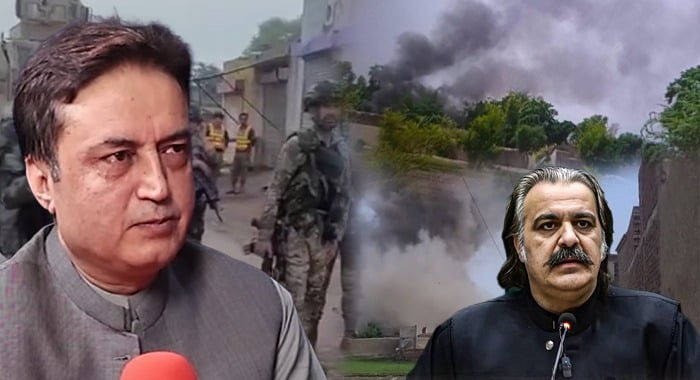Arif Yousafzai
As Operation Sarbakkaf commenced in Bajaur with the declared aim of countering the growing militant threat, Pakistan once again finds itself at a critical juncture where the absence of political consistency threatens to overshadow the efforts of its security forces. Rather than providing unified backing to the state’s counterterrorism initiatives, political leadership continues to waver, offering contradictory narratives that foster confusion among the public and embolden adversaries.
In Khyber Pakhtunkhwa, Chief Minister Ali Amin Gandapur initially rejected the idea of any military operation or drone usage within the province, asserting that the local administration would handle the security situation independently. Yet within days and following an Apex Committee meeting attended by civil and military leadership his stance shifted. In a video message, he referred to the army as “our guest,” urged the people to support the government, and called for unity in combating terrorism.
This sudden change in tone is not an isolated incident but part of a broader trend of irresponsible political conduct. The pattern is clear: leaders make strong statements in press conferences, deliver opposing views in party meetings, and shift narratives again after engagements with federal or military authorities. Such erratic messaging reflects a non-serious and unstructured political culture, where major decisions appear reactive rather than strategic.
Earlier, during an all-parties conference (APC) hosted by the provincial government in Peshawar, Gandapur went so far as to publicly state that no military operation would be allowed in Khyber Pakhtunkhwa, and that the army should restrict itself to defending the borders. He insisted the province would handle internal threats through its police and civil institutions. His statements surprised many, especially given their overt opposition to the military’s role in internal security. But soon after, during the Apex Committee meeting, his message was completely reversed.
This kind of political inconsistency does not serve the national interest. In fact, it weakens public trust, demoralizes institutions, and creates space for extremist groups to exploit division. When provincial leadership sends mixed signals—sometimes supportive of the army, other times sympathetic to militants, or advocating for Jirgas as an alternative to state action it becomes difficult to build a cohesive national policy against terrorism.
This duplicity is not limited to one party or province. Across the board, major political parties whether PML-N, PPP, JUI-F, ANP, or Jamaat-e-Islami have maintained ambiguous stances. On one hand, they demand the army ensure peace; on the other, they refuse to accept the necessary consequences of such operations. Some publicly oppose counterterrorism actions while privately supporting them, fearing electoral backlash or losing local support.
The same applies to drone warfare. While the KP leadership rejects drone use, video evidence and credible reporting suggest that militant groups particularly the Hafiz Gul Bahadur faction have begun employing drone technology themselves. In areas like Miryan, drone footage attributed to militant sources has surfaced. According to available information, Hafiz Gul Bahadur’s group has claimed responsibility for certain attacks, while other militant factions deny possessing such technology. Still, the presence of advanced weapons among insurgent groups points to a new phase of modern asymmetric warfare—one that cannot be addressed through outdated or politicised approaches.
In parallel, there is a growing trend of using Jirgas as a substitute for structured policy. While the Jirga system holds cultural value in Pashtun society, its political appropriation has diluted its integrity. Today, self-declared elders and political actors invoke Jirgas as a quick fix without community mandate or legitimacy. This weakens genuine conflict-resolution mechanisms and trivialises a tradition that once stood for justice and collective wisdom.
Meanwhile, the civilian population continues to suffer. In Bajaur, the site of Operation Sarbakkaf, large public demonstrations have been held not in favour of militants, but calling for both militants and the military to leave civilian areas. People are raising white flags, asking simply for peace. The provincial government has announced financial compensation for civilian casualties, but residents remain fearful of prolonged conflict.
The situation in southern KP and former FATA regions is deteriorating. Taliban influence is expanding, and reports of organised militant gatherings in multiple villages are becoming more frequent. Yet, despite the gravity of the threat, political parties remain reluctant to take clear ownership of this war.
Let it be clear: this is not a failure of the armed forces or law enforcement. Pakistan’s security institutions continue to operate across hostile zones, often at great cost. But they cannot and should not be expected to win this fight alone. Without credible political will, without public trust, and without a united front, the state risks entering a prolonged and unwinnable struggle.
This is not just a security dilemma; it is a governance crisis. Pakistan’s larger political system has alienated the public. The absence of justice, the erosion of economic opportunities, and the unchecked corruption of political elites have left citizens disillusioned. When the poor see that those who loot the country in daylight return to power by nightfall, their faith in the state is eroded. In a digital age where manipulation is visible in real-time, the people are no longer passive observers they are angry, disengaged, and vulnerable to alternative narratives.
If we are to overcome this moment, we must first recognise that duplicity has no place in national security. Political leaders must stop playing both sides. A war cannot be won by those who speak against it at press conferences but support it in private meetings. The time has come for credible, principled, and capable leadership those who can engage both the military and the people with honesty and resolve.
Pakistan faces a long and difficult road ahead. But progress is only possible if we dismantle the structures of ambiguity, replace expediency with accountability, and commit—without exception or excuse—to the national interest.





